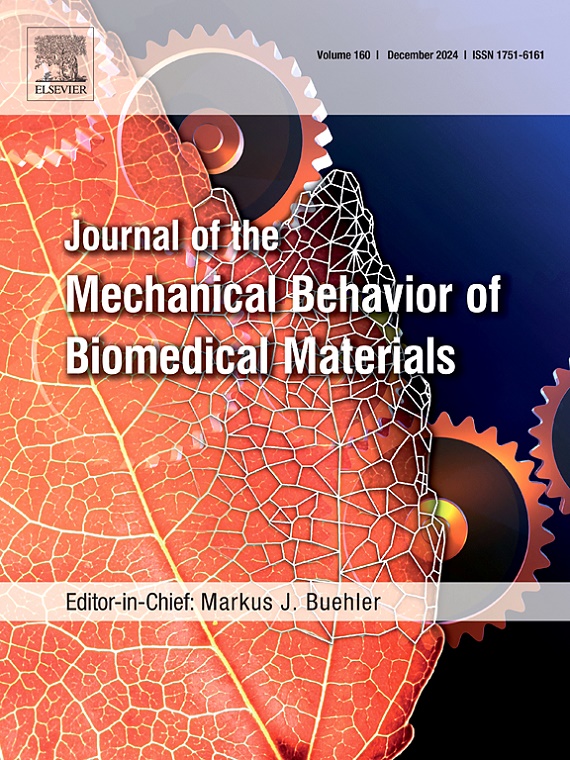血栓成分对使用人体血栓模拟机械数据进行虚拟血栓切除术的影响。
IF 3.3
2区 医学
Q2 ENGINEERING, BIOMEDICAL
Journal of the Mechanical Behavior of Biomedical Materials
Pub Date : 2025-01-02
DOI:10.1016/j.jmbbm.2025.106886
引用次数: 0
摘要
血管内取栓(Endovascular thrombectomy, EVT)的目的是通过移除阻塞大脑大动脉的血栓来恢复急性缺血性中风患者的血流。在使用支架回收器的过程中,血栓在装置内被捕获,然后被取出,使血栓受到几种力,可能导致其碎裂。在计算机上的研究,以及血栓的机械特性,可以增强我们对EVT的理解,帮助开发新的设备和介入策略。我们的小组先前验证了一种数值方法来研究EVT能够解释血栓碎片。在本研究中,采用相同的方法来探索所选择的失效准则对EVT模拟的适用性以及血栓组成对计算机程序结果的影响。人类凝块类似物的实验数据首次应用于该方法。测试了三种不同成分的凝块类似物,并校准了包含失效的材料模型,随后进行了验证分析。最后,使用校准的材料模型进行EVT模拟,将三种测试的血栓组成与三种不同的支架回收器模型结合起来。实验结果证实了应力-应变曲线的压张不对称,随着红细胞含量的增加,刚度降低。将所得的材料模型应用于EVT模拟表明:(i)失效准则依赖于血栓网格大小,(ii)富含红细胞的血栓更倾向于碎片化,(iii)与富含红细胞的血栓相比,检索缺乏红细胞的血栓的难度增加。本文章由计算机程序翻译,如有差异,请以英文原文为准。

Impact of thrombus composition on virtual thrombectomy procedures using human clot analogues mechanical data
Endovascular thrombectomy (EVT) aims at restoring blood flow in case of acute ischemic stroke by removing the thrombus occluding a large cerebral artery. During the procedure with stent-retriever, the thrombus is captured within the device, which is then retrieved, subjecting the thrombus to several forces, potentially leading to its fragmentation. In silico studies, along with mechanical characterisation of thrombi, can enhance our understanding of the EVT, helping the development of new devices and interventional strategies. Our group previously validated a numerical approach to study EVT able to account for thrombus fragmentation. In this study, the same methodology was employed to explore the applicability of the chosen failure criterion to EVT simulations and the impact of thrombus composition on the outcome of the in silico procedure. For the first time, human clot analogues experimental data were applied to this methodology. Clot analogues of three different compositions were tested, and a material model incorporating failure was calibrated, followed by a verification analysis. Finally, the calibrated material model was used to perform EVT simulations, combining the three tested thrombus compositions with three different stent retriever models. The experimental tests confirmed a compression-tension asymmetry in the stress-strain curves, showing decreasing stiffness with increasing the red blood cell (RBC) content. Applying the resulting material models to EVT simulations demonstrated: (i) the dependency of the failure criterion on the thrombus mesh size, (ii) a greater tendency for RBC-rich thrombi to fragment, and (iii) increased difficulty in retrieving RBC-poor thrombi compared to RBC-rich thrombi.
求助全文
通过发布文献求助,成功后即可免费获取论文全文。
去求助
来源期刊

Journal of the Mechanical Behavior of Biomedical Materials
工程技术-材料科学:生物材料
CiteScore
7.20
自引率
7.70%
发文量
505
审稿时长
46 days
期刊介绍:
The Journal of the Mechanical Behavior of Biomedical Materials is concerned with the mechanical deformation, damage and failure under applied forces, of biological material (at the tissue, cellular and molecular levels) and of biomaterials, i.e. those materials which are designed to mimic or replace biological materials.
The primary focus of the journal is the synthesis of materials science, biology, and medical and dental science. Reports of fundamental scientific investigations are welcome, as are articles concerned with the practical application of materials in medical devices. Both experimental and theoretical work is of interest; theoretical papers will normally include comparison of predictions with experimental data, though we recognize that this may not always be appropriate. The journal also publishes technical notes concerned with emerging experimental or theoretical techniques, letters to the editor and, by invitation, review articles and papers describing existing techniques for the benefit of an interdisciplinary readership.
 求助内容:
求助内容: 应助结果提醒方式:
应助结果提醒方式:


